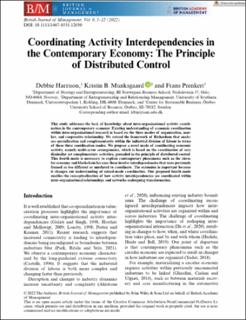Coordinating Activity Interdependencies in the Contemporary Economy: The Principle of Distributed Control
Peer reviewed, Journal article
Published version
Permanent lenke
https://hdl.handle.net/11250/3080669Utgivelsesdato
2022Metadata
Vis full innførselSamlinger
- Scientific articles [2181]
Sammendrag
This study addresses the lack of knowledge about inter-organizational activity coordination in the contemporary economy. Existing understanding of economic coordination within inter-organizational research is based on the three modes of organization, market, and cooperative relationship. We extend the framework of Richardson that analyses specialization and complementarity within the industrial division of labour in terms of these three coordination modes. We propose a novel mode of coordinating economic activity, namely multi-actor arrangements, which is based on the coordination of very dissimilar yet complementary activities, grounded in the principle of distributed control. This fourth mode is necessary to explain contemporary phenomena such as the circular economy and blockchain because these involve interdependencies that were previously framed as too different or unrelated to coordinate. The extension is important because it changes our understanding of mixed-mode coordination. Our proposed fourth mode enables the conceptualization of how activity interdependencies are coordinated within inter-organizational relationships and networks undergoing transformation.

